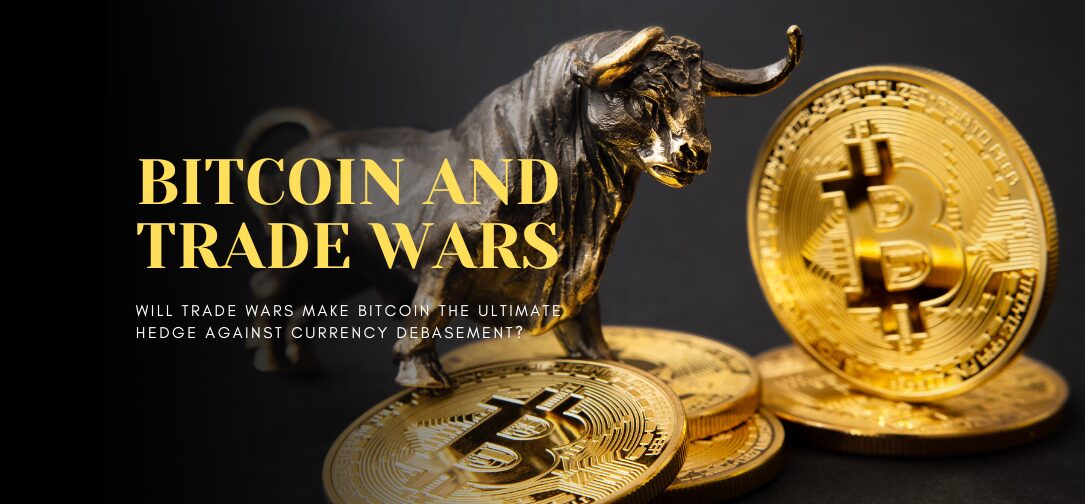As trade tensions rise and sovereign debt levels hit alarming thresholds, investors are rethinking how they hedge against monetary instability. In recent months, Bitcoin has started to diverge from its traditional correlations, raising a compelling question: Could Bitcoin become the go-to hedge against dollar debasement in the age of global trade wars?
From a historical perspective, Bitcoin has often moved in tandem with risk assets—most notably the Nasdaq and the broader S&P 500 index. But data from the past two quarters shows a clear shift: BTC has begun to decouple from equities and even altcoins, while showing an increasingly strong correlation with gold. This movement signals a potential reclassification of Bitcoin by the market—not just as a speculative asset, but as a digital store of value with geopolitical significance.
The Macroeconomic Backdrop: A Perfect Storm
The U.S. budget deficit is approaching 6% of GDP, a level typically reserved for wartime economies or major recessions. With interest payments ballooning and tax revenues lagging, many economists are now warning of a possible debt spiral. Ray Dalio, founder of Bridgewater Associates, has repeatedly warned that the U.S. risks debasing its currency to deal with long-term debt obligations. In such a scenario, hard assets—those that cannot be printed or politically manipulated—tend to outperform.
Historically, gold has filled this role. But Bitcoin offers something new: a decentralized, borderless alternative to sovereign money. Unlike fiat currencies, it cannot be weaponized in trade wars, sanctioned, or printed into inflation.
Bitcoin: The Unaligned Reserve Asset?
President Donald Trump recently hinted at a dramatic shift in policy by suggesting that Bitcoin could become a component of U.S. currency reserves. While the statement drew mixed reactions, it underscores the growing legitimacy of Bitcoin as a reserve-grade asset. For a nation increasingly embroiled in trade tensions with other large economies—especially China—holding a politically neutral asset could offer a strategic advantage.
Bitcoin’s protocol-level independence makes it attractive in a world where traditional currencies are increasingly viewed through geopolitical lenses. As nations move away from dollar hegemony and toward digital currency experimentation, Bitcoin sits uniquely outside of this politicized ecosystem.
A Hedge, but Not Without Risks
Despite its potential, Bitcoin is not without headwinds. Leverage remains a persistent concern, particularly as large institutional vehicles like Grayscale Bitcoin Trust (GBTC) consolidate significant market influence. Some analysts worry that concentrated positions and thin liquidity could expose Bitcoin to long-squeeze events, artificially suppressing prices in times of volatility.
Regulatory risk also looms large. While the U.S. appears to be taking a measured approach—recognizing the value of stablecoins and tokenized treasuries—there’s still ambiguity around Bitcoin’s long-term treatment under securities law. Should regulatory sentiment shift suddenly, the implications for institutional flows would be immediate.
Another wildcard is quantum computing. While the threat is still theoretical, breakthroughs in quantum technology could potentially compromise Bitcoin’s cryptographic foundation. The community is actively researching quantum-resistant protocols, but until they are fully implemented, this remains an open concern for long-term holders.
Bitcoin’s Advantage in a Fragmented World
In a multipolar economic order, Bitcoin offers a uniquely apolitical hedge. While central banks explore digital currencies and stablecoin models, all are inherently tied to sovereign control and policy frameworks. Bitcoin stands apart—neither a tool of any government nor easily manipulated by one.
This feature becomes especially relevant in times of trade wars. Unlike fiat currencies, which are subject to sanctions, tariffs, and capital controls, Bitcoin remains accessible. For corporations and high-net-worth individuals in emerging markets, it may soon function not just as a store of value, but as a strategic reserve and cross-border settlement layer.
Moreover, with major platforms like BlackRock and Fidelity entering the market via ETFs and digital asset products, the infrastructure for institutional adoption is stronger than ever. These inflows may ultimately dampen volatility and solidify Bitcoin’s status as a macro hedge.
A Moment of Redefinition
Bitcoin’s decoupling from traditional risk assets isn’t merely a technical anomaly—it could be the beginning of a new investment narrative. As trade tensions escalate and fiscal policy becomes more inflationary, markets may be starting to reprice Bitcoin not as “digital tech” but as “digital gold.”
This shift is not just academic. It has profound implications for portfolio construction, central bank strategy, and the global financial system as a whole. While Bitcoin still faces structural and regulatory hurdles, its unique characteristics make it a viable candidate for a new kind of reserve asset—one built for a digital, multipolar world.
As someone who has built a digital asset exchange serving millions of users across 127 countries, I believe we are only beginning to understand Bitcoin’s evolving role. The market is speaking, and what it’s saying is clear: in times of uncertainty, neutrality is value.
About the Author
Valentin Preobrazhenskiy is the founder and CEO of LATOKEN, a top-50 global cryptocurrency exchange. He is also a former director and mentor at Founder Institute and the founder of Blockchain Economic Forum. Under his leadership, LATOKEN has facilitated the launch of over 2,000 digital assets and has been featured in Forbes, Bloomberg, TechCrunch, and NASDAQ.



































